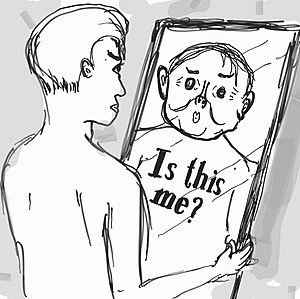A cartoon of a patient with body dysmorphia looking in a mirror, seeing a distorted image of himself. (Photo Courtesy: https://en.wikipedia.org/wiki)

Orentsani Kithan
Psychologist, Developmental Pediatrics, CIHSR Dimapur
How happy you are with the way you look? How often do you look at yourself in the mirror and wished you had a better nose, hair, chin….? Do you sometimes avoid social dos and obligations because you feel others will make fun or judge your appearance? Have you visited or consulted specialists to change your appearance in some way?
Body Dysmorphic Disorder (BDD) is a mental health condition “characterized by a preoccupation with an imagined defect in appearance that causes clinically significant distress or impairment in important areas of functioning.” Also if an actual physical problem is present, the person’s concern with the problem is excessive causing difficulties in functioning.
Several descriptions about it can be found in the past – obsession de la honte du corps(obsession with shame of the body), Freud’s Wolf-man (who was excessively concerned with his nose), dysmorphophobia (compulsive neurosis)
Studies have shown that BDD is present more in females than males and usually starts from adolescence with onset between 15 and 30 years.
BDD causes preoccupation with nonexistent or slight defects in physical appearance, with beliefs that they look abnormal, unattractive or ugly which lead to repetitive patterns of behavior. Mental health issues like Depression, Anxiety, Suicidal ideation are commonly associated with BDD.
Features of BDD:
1. Appearance preoccupation: Preoccupation with the physical appearance of none or more body parts which are difficult to resist or control and causes distress. Studies have shown that the most commonly disliked body parts are Skin, Hair, Nose, Stomach, Breasts/Chest, Eyes.
2. Compulsions/Rituals- Compulsions are repetitive behaviors or mental acts intended to fix, hide, inspect the disliked body parts. These compulsive acts include Camouflaging, Comparing, Mirror checking, excessive grooming, seeking reassurance of others, clothes changing, skin picking, excessive exercising or weight lifting, compulsive shopping etc.
Some resort to cosmetic procedures to correct the presumed body defect. However, studies have shown that BDD symptoms rarely improves with cosmetic intervention. Many patients with BDD stop working, refuse to attend school, drop out of school, and avoid activities and other people because of the belief that they are ugly and don’t want to be seen.
In the present society where physical appearance is given a lot of importance, it is not surprising that this condition is on the rise especially in the younger generation. South Korea is known as the Plastic Surgery Capital of the world with the highest rate of plastic surgeries in the world. Recent statistics suggests that around one in three women between 19 and 29 have had plastic surgery to conform “to the beauty standards of the country and for better job and marriage prospects.”
BDD is thus a chronic psychological condition and the treatment usually consists of medications with therapy mainly Cognitive Behavior Therapy focusing on challenging or changing the negative beliefs about the body as well as working on developing self-esteem and enhancing self-image. Self-love and self-acceptance goes a long way in being okay with your body shape, appearance and structure- consciously practicing self-love has been shown to improves your mental health by “reducing anxiety and depression, improving optimism, better recovery from stress and better adherence to healthy behavior changes, such as exercise and diet.”
Kristin Neff, the pioneer of self-compassion research, describes Self-love as follows:
“Self-compassion involves treating yourself with the same kindness, concern, and support you’d show to a good friend. When faced with difficult life struggles, or confronting personal mistakes, failures, and inadequacies, self-compassion responds with kindness rather than harsh self-judgment, recognizing that imperfection is part of the shared human experience.” (Neff & Dahm, 2015)





